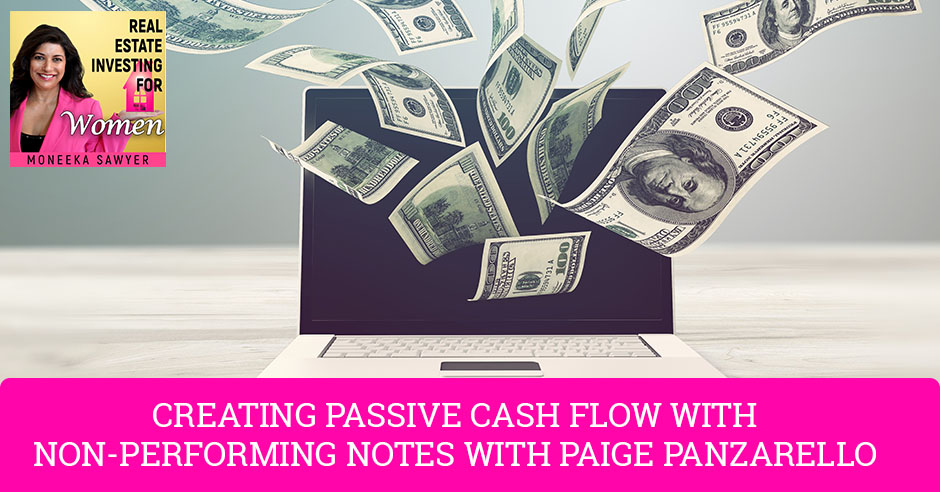Creating Passive Cash Flow With Non-Performing Notes With Paige Panzarello – Real Estate Women

Can you imagine what it’s like $20 million dollars just when you’re starting to perform well in real estate? Paige Panzarello went through this ordeal in 2007, and it almost ended her real estate career. But now she’s bouncing back and she’s doing well with passive cash flow. And she’s doing it with non-performing notes! Listen to this episode as Paige tells it all to Moneeka Sawyer.
—
Watch the episode here
Listen to the podcast here
Creating Passive Cash Flow With Non-Performing Notes With Paige Panzarello – Real Estate Women
Real Estate Investing For Women
I am so excited to welcome to our show, Paige Panzarello. Having been a real estate investor and entrepreneur for many years, Paige has experienced many facets of real estate investing. Her experience includes founding and running her own residential and commercial construction and acquisition company.
She does buy and hold residential and commercial real estate investing, tax deeds and liens investing, and fix and flip residential remodeling and other forms, to name a few. She focuses on non-performing notes that she purchases all across the United States. Whether in residential or commercial real estate in California, Arizona or nationwide, Paige has been successful in completing over $150 million in real estate transactions to date. Welcome to the show, Paige. How are you?
Thank you so much for having me on. I’m so excited to be here.
Let’s start with your story. Tell us where you have been.
I have been a real estate investor for many years. I started my real estate investing career a little differently than most people. I literally was thrown into the deep end of the pool by virtue of inheritance. I knew nothing about real estate investing or real estate, much less investing. My grandmother passed away.
She had a rather sizable estate, half of which was in California and half of which was in Arizona. Off I went at a very young age to Arizona, knowing nothing about real estate or real estate investing. We had 38 townhome units that were only about 40% occupied. We had a sewer treatment plant and some land. I knew nothing about anything. Unfortunately, the estate was about $4 million in debt.
I was thrown into the deep end of the pool and learned quickly that all I had to do was ask questions and surround myself with people that had the answers. I was good at that and doing what I said I was going to do. If I said I was going to do something and asked the people that we owed money, I asked them to work with me, and they did. The flip side is that I was able to do what I said I was going to do. I quickly built a reputation, a good one, which was paramount.
I was able in three years to turn the properties around. We brought it back into the black in about three years. We were in a boutique market in Arizona, and I realized that we weren’t going to be able to sustain profitability. I went to my family and said, “I want to build on the land, sell the units and the sewer treatment plant.” They were all for selling the sewer treatment plant, by the way. I wanted to leverage that and go into building the land.
My family said, “I don’t want any part of that.” I said, “I want to buy the company, which I did.” I started to develop the land and hired a contractor. I realized very quickly that he was going to bankrupt me before I was even coming out of the ground. I fired him and found somebody else that would be my qualifying party. I started a construction company knowing nothing about construction. I set the pace to put us on the fast track. We were rocking and rolling. In three years’ time, we had 36 employees. We held all our licenses except HVAC and roofing.
The reason that we didn’t have those is that the insurance was way too high. We were building our own projects, everybody else’s projects, and it was great. Except that, even at that young age, I was exhausted and working myself 18 hours a day, 7 days a week, into an early grave. I was making money hand over fist. I had a lot of assets and liquidity. I thought I was having a good time, and 2007 happened.
Even if you know nothing about real estate, you can still pursue a business within the industry. Share on XThe funny thing is I saw it coming but I was naive in the fact that I thought, “This is not going to happen to me because I’m only leveraged about 10%.” I was wrong. It happened right on top of my head. Everybody that owed me money, their funding froze up. I was in the unique position that I did not have to go through bankruptcy to discharge the debts that I owed. I sold off everything that I owned. I had liquidity and cash. It took me about three years but I paid everybody off. I had a fire sale, everything. At the end of the day, I lost $20 million.
I walked away with my head held high, which was important to me. I still have investors that I work with now because of that. I wanted to make everybody else hold. That was important to me. I walked away from real estate investing for a little while, but I came back like everybody else. I had to rebuild. I didn’t have the money to put it together but I did have a good brain for real estate. I love it. I have a passion for it and a passion for helping people. I went the same route that everybody goes, wholesaling, fixing, and flipping. Some buy and hold as you grow, tax liens, and tax deeds.
I was also looking into and studying non-performing notes. About a year after I started studying it, I bought my first one. Angels sang for me. When you lose $20 million, that has a tendency to shape you as an investor. I know all of my risk tolerance. I know exactly where I’m going. When I landed in the note space, I was ecstatic because it has everything I possibly want as an investor. I never looked back.
Tell me a little bit about notes.
Notes basically are your promise to pay. There’s a variety of different kinds of notes that you can buy. I focus on the first position, meaning I’m the first one to get paid. First position non-performing notes that are secured by residential real estate. You can buy notes that are against cars. You can buy notes that are credit card debt. All those things are promises to pay.
When you finance anything, that’s your promise to pay. That’s a note. I focus on the non-performing space as opposed to the performing space. The performing space is the borrower paying their monthly payment. The non-performing space is where the borrower has stopped paying their monthly payments. My notes again are secured by residential real estate.
Why would you do non-performing?
I get that a lot, “Why on Earth would you buy a non-performing note when someone stopped paying?” The answer is there’s a variety of different reasons but the biggest one is that we would get a big discount. When you buy something at a steep discount, you build in a cushion of equity. That gives you power and control where you can mitigate your risk. After 2007, I was all about power, control, and mitigating risk.

Passive Cash Flow: Ask questions and surround yourself with people who have the answers.
As an investor, can you make money with non-performing notes? How does that work?
When we buy a non-performing note, there is a face value of the note. The Unpaid Principal Balance is also called the UPB. Let’s say that’s $100,000, but the market value of the property is only $80,000. That note is underwater. Those borrowers are underwater. When I buy a note, I buy it based on the current market value of the securing collateral, also known as the house. It’s $80,000, and I will buy it at a deep discount from there. It used to be we were able to buy notes anywhere between 40% and 50%, sometimes even a little less. Now it’s hovering around 55% to 60%, still quite a nice size equity cushion.
For that same $80,000 house, I’m spending $45,000 for the note. They will buy and build in a huge equity cushion. The borrower still owes me $100,000 because the unpaid principal balance is $100,000. I have a lot of flexibility and maneuverability to work with that borrower to either get them to reperform and start paying on their mortgage or sometimes our borrowers will give us what’s called a deed in lieu of foreclosure. They don’t want the house anymore but don’t want the foreclosure on their record.
They will deed us the property as payment in full. I can turn around and sell that house for $80,000 because that’s the market value of the property. That’s how I make money as a note investor in buying non-performing notes. The best part, though, is if we get it to reperform, not only am I generating chunks of cash. I’m also generating streams of monthly cashflow. I’m creating two different avenues of money coming into my pocket in the same vehicle, which is tremendous as far as I’m concerned.
Tell me a little bit more about that. How does that work?
In terms of the reperformance or the exit strategies because we have 23 different exit strategies in note investing. Remember, I’m risk-averse. With 23 different exit strategies that are avail, we are able to mitigate that risk. Were you asking about the reperforming situation and how we generate chunks and streams of cash?
Yes.
Getting a borrower to reperform is my favorite exit strategy that we use. It happens about a third of the time. We generally only use four main exit strategies but we still have 23 at our avail. Everybody knows about foreclosure. That’s one of our exit strategies. Sometimes, we have two. Short sale, everybody knows what a short sale is. It’s $100,000, and the borrower comes to us and says, “I have somebody that’s willing to buy it for $80,000. Will you accept it?” How fast do you think I’m going to say yes?
When you say something you need to do, just do it. Share on XDeed in lieu of foreclosure, I’ve already explained. The reperforming situation is my favorite. The borrower comes to us through our loss mitigation team. This is something I understand that I have a team in place. I have direct contact with our borrowers because I’ve got a very big heart, and everybody has got a story. I am not a licensed debt collector. The team that I pay is licensed, debt collectors.
They know all the CFPB rules and regulations. It’s well worth the small fee that I pay them per asset, per month, to deal directly with our borrowers. They are the liaison. Through our team, we talk with our borrowers and let us know that they want to stay. Let’s say that the same unpaid principal balance is $100,000, the house is only worth $80,000, and they haven’t paid for 2 or 3 years.
We get a lot of these that haven’t paid 2, 3, 4, even sometimes longer. They now owe us another $20,000 between arrearage, and maybe we have fronted some property taxes, so we don’t lose our collateral that’s securing our invested dollars. Let’s say the total amount due, the total legal balance is $120,000 but the house is only worth $80,000. There’s $40,000 on the hole.
They say they want to stay, had a medical condition, whatever, but now, they can pay. We are in a position where we can go to that borrower, and eventually, we do this through what’s called a forbearance agreement. We don’t do a permanent loan modification immediately. The borrower hasn’t paid for a while. They have to have a little skin in the game.
We will say to them, “We are going to require a reinstatement fee.” It’s usually somewhere around $2,500 to $5,000, depending. Believe me, when people want to stay in their homes, they figure out a way to come up with that money. There’s that chunk of cash. We will say to them, “We will put on hold the $40,000 that is underwater.”
We will do the forbearance agreement and a trial payment plan. You pay your reinstatement fee. We can do so many different things. We can lower interest rates and payments. We can create a new amortization schedule. We can stretch out their payments and make their payments lower. We can forgive some of the principal balance.
We will work out a payment plan that works for that borrower that works for us in terms of our numbers as well. If they pay for the first 4 to 6 months on time, every time, we will take half of that $40,000 and forgive it. If they pay on time, every time for the next 4 to 6 months, we will forgive the other half. At that point, we will put a permanent modification in place at $80,000, which is the market value of the property.
It is a more manageable mortgage for our borrower, at $80,000. We’ve created a chunk of cash at the beginning of this whole process. We’ve monthly cashflowed every single month. There are your streams of cash. At the end of the twelve months, we have a decision to make because we now have what’s called a season’s note.

Passive Cash Flow: When you buy something at a steep discount, you build in a cushion of equity and that gives you power and control where you can mitigate your risk.
There are plenty of note investors that are out there that like the performing notes because they like the monthly cashflow but they don’t want to be a landlord. They don’t want the tenants and toilets. They are willing to buy that performing seasoned note from us. We slightly discount it to another note investor. They are willing to buy that close to close to par, which is close to the $80,000. We will discount it a little bit and give them an equity cushion. You can see how that’s very profitable or we can hold onto it and keep cashflowing it. We do choose to do that as well.
That’s one of your exit strategies. I can totally see that you have a big heart. You want people to be able to keep their homes, and I feel the same way. It’s beautiful.
Especially after the 2007 crash, I have had life happen to me, and sometimes I have to take off my heart hat and put on my hard hat, and that’s never fun to do. My goal is to set out to help people. I’m in a position, by becoming the bank as a note investor, to do that for those that qualify, and not everybody qualifies but that’s a big thing for me.
You told us a little bit about your exit strategy, why don’t you walk us through the steps of acquiring a non-performing note?
Acquiring a non-performing note is very similar to any other type of real estate investing. There are two things that everybody looks for in real estate investing. One is deals, and the other is money. Note investing is no different. It’s about your network and networking. I like to think of investing as a more gentle form of real estate investing.
There is competition but it’s not nearly as fierce as the fix and flip market. You need to network. As everybody knows, your net worth is determined by your network. You need to get out there, start asking questions, start talking to people, go to REIA meetings, join BiggerPockets, and listen to podcasts. All those things are important to get you into the note space.
The interesting thing about the note space is at the asset managers. I used that word as an all-encompassing word. These are the people that handle portfolios for a variety of different sources, banks, hedge funds, other note investors, smaller commercial banks, community banks, credit unions, etc. The asset manager is the one that handles the portfolio and the disposition of the assets. Asset managers in the note space it’s very collaborative.
As you develop your relationship and your reputation with these asset managers, they will introduce you to other asset managers, which blew me away the first time that that happened to me. I thought, “Why on Earth would he do that?” You would think that there would be a lot more competition but there isn’t. That’s great too. If you do what you say you are going to do in the note space, and by the way, that is paramount, please do not waste these asset managers’ time. They do not like it, and you won’t get any more products. As long as you develop that relationship, they will help to catapult you to the next level.
You have to put action behind the desire. That's how you start. Share on XThat’s true with everybody, do what you say you are going to do. It’s also interesting how we don’t do what we say we are going to do for ourselves. There’s one thing about doing what you say you are going to do for other people but what about for yourself too? Part of building a blissful wealth empire is keeping your commitments to yourself, making yourself a priority and your promises a priority to yourself and others.
That’s such a hard thing for entrepreneurs because, as entrepreneurs, we put everybody else in front of us all the time, and it’s almost like we feel guilty if we take a spa day.
There are other ways. Yes, in the take care of yourself. That’s very important. The other thing is I’m committed to learning about real estate, and these are the steps that I’m going to take. Instead of putting off those steps, it’s to keep those promises. “Now I’m going to research notes or I’m going to send to this person to further that business.” Much of the timepieces of this can be intimidating.
It can be scary. They can feel overwhelming. Instead of keeping our promises, we procrastinate. That slowly chips away at our self-confidence. On all levels, whether it’s for your business, yourself or your family, keep your promises to yourself and the people around you. Tell me, what is the most rewarding part of investing in notes?
I get to create win-win situations for everybody. If I can help a borrower reperform and stay in their home, that is the most rewarding. We have had situations where we have had families and single moms that have a couple of kids that are going through a divorce. The big banks didn’t care. We came in and were able to help keep that family, that single mom, and her kids and their home. That is fulfilling and rewarding to me, more so than any amount of money. Having gone through and had life happen to me is the most rewarding part for me all day long.
Haven’t you loved hearing Paige talk about her notes investing strategy? Do you want to learn more from her? You can learn how to create real wealth with real estate-backed non-performing notes from June 10th to 12th. In Paige’s three-day, hands-on, interactive, virtual, and packed with information event, you will learn how to get started investing in notes so you can grow your nest egg, achieve your goals faster, retire early with peace of mind, create chunks of cash and streams of monthly cashflow. The options are endless, and you will be helping people stay in their homes.
Ladies in the green room before the show, Paige mentioned that this is the only event she’s offering this year. Don’t miss it. Otherwise, you will have to wait a long time to get this opportunity again. Take action now, so you can take advantage of this market. The opportunities in notes are staggering. See what all the buzz is about and reserve your seat now at BlissfulInvestor.com/notes. The virtual live event is from June 10th to 12th. Are you ready for three rapid-fire questions?
I am.

Passive Cash Flow: Just as long as you stand in integrity and you behave that way, people will be understanding because life does happen. Mistakes are made but don’t lie to people and don’t try and pull the wool over their eyes, just stand in your integrity, own up to it.
Tell us one super tip on getting started in real estate investing?
Take action. You can educate yourself to the cows come home but if you have analysis paralysis, you are never going to go anywhere. You got to put action behind the desire. That’s how you start.
What is one strategy for being successful in real estate investing?
This is a big one. To be successful, you have got to make the deal conform to you and who you are as an investor, not the other way around, do not ever conform to a deal. You set the guidelines, the outline, the bullet points, and what is your good risk tolerance and make the deal conform to you, do not conform to the deal.
What is one daily practice that you do that you would say contributes to your personal success?
I have integrity. We are all human. We all make mistakes. I don’t ever try and pull the wool over somebody’s eyes. If I make a mistake, I own up to it. People know when you are dealing with people and teams, money and emotions, there’s a big swirling around of all of that. As long as you stand in integrity and you behave that way, people will be understanding because life does happen. Mistakes are made, but don’t lie to people and don’t try and pull the wool over their eyes. Stand in your integrity, and own up to it. Believe me, and you will have more forgiveness and a better, stronger relationship if you behave that way. That’s how I conduct not only my business but my life.
Thank you so much for all of your words of wisdom for my audience. This show has been amazing.
Thank you for having me. I enjoyed it.
Don’t miss Paige’s upcoming three-day virtual live event from June 10th to 12th. It will be a long time before she’s going to be doing this again. Don’t miss it. Sign up now at BlissfulInvestor.com/notes. Thank you so much for joining Paige and me for this show. I look forward to seeing you next time. Until then, remember, goals without action are just streams. Get out there, take action and create the life your heart most deeply desires.
Important Links
About Paige Panzarello
 Paige Panzarello is the “Cashflow Chick”. Having been a Real Estate investor and entrepreneur for almost 25 years, Paige has experienced many facets of real estate investing. Her experience includes founding and running her own Residential and Commercial Construction and Acquisition companies, Buy and Hold residential and commercial real estate investing, Tax Deeds/Liens Investing, Fix and Flip (Residential Remodeling), and other forms to name a few. She currently focuses on Non-Performing Notes that she purchases all across the United States. Whether in notes, residential or commercial real estate, in California, Arizona, or nationwide, Paige has been successful in completing over $150 million in real estate transactions to date.
Paige Panzarello is the “Cashflow Chick”. Having been a Real Estate investor and entrepreneur for almost 25 years, Paige has experienced many facets of real estate investing. Her experience includes founding and running her own Residential and Commercial Construction and Acquisition companies, Buy and Hold residential and commercial real estate investing, Tax Deeds/Liens Investing, Fix and Flip (Residential Remodeling), and other forms to name a few. She currently focuses on Non-Performing Notes that she purchases all across the United States. Whether in notes, residential or commercial real estate, in California, Arizona, or nationwide, Paige has been successful in completing over $150 million in real estate transactions to date.
She has been a regularly featured guest on “The Cashflow Guys” podcast, and you can also find her on the “Best Ever Show” with Joe Fairless, “The Note Closers Show”, “Cashflow Ninja”, “Secrets to Real Estate Investing” and “Real Estate Investor Goddesses” podcasts, among many others. Paige has also been interviewed and highlighted in an article in the Wall Street Journal. She also speaks at various different Real Estate Investing clubs and conferences across the country.
Paige has been purchasing Non-Performing Notes (NPNs) since 2014, and she formed The Tryllion Group, which invests in Notes across the country.
Paige teaches the “Building Wealth with Notes” Workshop that drills down into the details of how to buy Non-Performing Notes, what to look for, due diligence to perform, and most importantly, how to mitigate risk. Her 10-week Master Class is a hands-on deep dive where Paige walks you through the nitty-gritty details to be a successful Note buyer.
Having experienced the hardship of the economic downturn of 2007, and what she calls “a very difficult learning experience”, Paige knows first-hand how “life can happen” to everyone. Her company was founded to help people in distress. Paige is also driven to help educate people on the importance of passive income, deal evaluation, money and debt management. She wants everyone to elevate their situation and become free of dependence on anyone or anything, so that when “life happens”, people will be ready, not broken.
Whether it is improving communities one house at a time, helping borrowers stay in their homes, or working with other investors to learn a new way to potentially earn higher returns for their investment dollars toward money cash flow or their retirement years, Paige is dedicated to helping people improve their lives in every way. She lives by the motto, “People first, profit second.”
______________________________________
To listen to the EXTRA portion of this show go to RealEstateInvestingForWomenExtra.com
To see this program in video:
Search on Roku for Real Estate Investing 4 Women or go to this link: https://blissfulinvestor.com/biroku
On YouTube go to Real Estate Investing for Women
Moneeka Sawyer is often described as one of the most blissful people you will ever meet. She has been investing in Real Estate for over 20 years, so has been through all the different cycles of the market. Still, she has turned $10,000 into over $5,000,000, working only 5-10 hours per MONTH with very little stress.
While building her multi-million dollar business, she has traveled to over 55 countries, dances every single day, supports causes that are important to her, and spends lots of time with her husband of over 20 years.
She is the international best-selling author of the multiple award-winning books “Choose Bliss: The Power and Practice of Joy and Contentment” and “Real Estate Investing for Women: Expert Conversations to Increase Wealth and Happiness the Blissful Way.”
Moneeka has been featured on stages including Carnegie Hall and Nasdaq, radio, podcasts such as Achieve Your Goals with Hal Elrod, and TV stations including ABC, CBS, FOX, and the CW, impacting over 150 million people.
